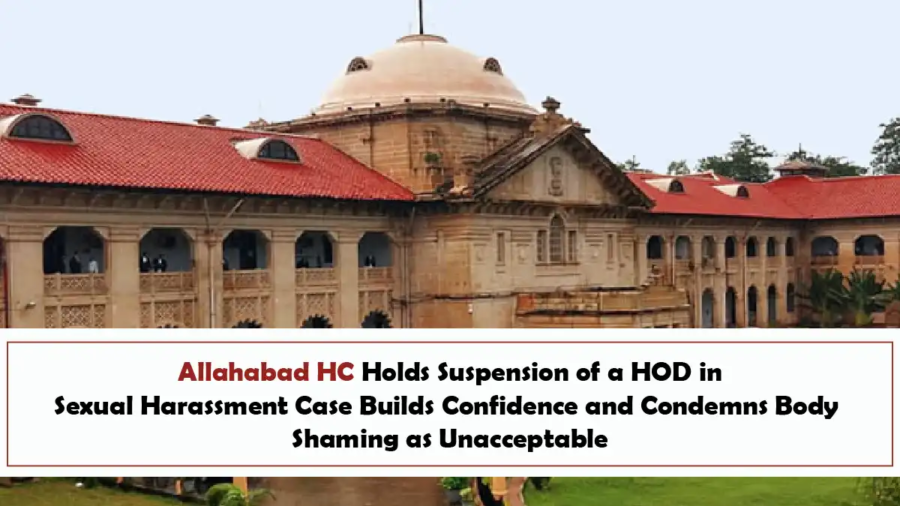Allahabad HC Holds Suspension of a HOD in Sexual Harassment Case Builds Confidence and Condemns Body Shaming as Unacceptable
Facts of the Case
The petitioner was employed as the District Programme Officer in Kushinagar. He was suspended by an order from the Chief Secretary of Child Development and Nutrition, Uttar Pradesh, based on allegations of sexual harassment by a female employee. The complaint included remarks such as calling the complainant “fatty” and repeatedly inviting her for evening walks and meals. The petitioner challenged his suspension on grounds that the alleged conduct did not amount to sexual harassment and that the internal committee (IC) was not properly constituted under Section 4 of the Sexual Harassment of Women at Workplace (Prevention, Prohibition and Redressal) Act, 2013. The petitioner argued that the procedural requirements were not followed, and the IC had not allowed him to properly defend himself, including by cross-examination.
On the other hand, the respondent contended that the petitioner’s behaviour constituted sexual harassment, including body shaming, which made several women in the petitioner’s department uncomfortable. An FIR was also lodged against the petitioner for sexual harassment of another woman, further supporting the decision to suspend him.
Contention of the Petitioner
The petitioner’s counsel argued primarily on two grounds. First, that the alleged conduct calling the complainant “fatty” and inviting her out socially did not constitute sexual harassment under the law. Second, that the procedure mandated by the Sexual Harassment of Women at Workplace Act was not followed. Specifically, the petitioner maintained that the IC was not properly constituted under Section 4 and that he was not given a fair opportunity to defend himself, such as through cross-examination. The petitioner also claimed that the suspension was premature and unjustified.
Contention of the Respondent
The respondent’s counsel argued that the petitioner’s conduct amounted to sexual harassment as it included body shaming and other inappropriate remarks that created a hostile work environment. It was emphasized that the petitioner had been recorded giving a statement and thus could not claim inability to defend himself later. The respondent also referred to an FIR lodged against the petitioner for a similar sexual harassment complaint, highlighting a pattern of behaviour that had caused discomfort among multiple women employees under the petitioner’s supervision. Therefore, suspension was justified to protect employees and preserve the integrity of the inquiry.
Court’s Observations
The Court emphasized that suspension is not a punishment but a preventive measure. It held: “An employee is placed under suspension by the employer only to ensure that he is not able to influence the enquiry in any manner, in as much as he is not able to interfere with the evidence or also in such cases where the employer finds it necessary to place an employee under suspension so as to have smooth disposal of disciplinary proceedings.” The Court drew upon settled principles of service law and cited the Supreme Court’s decision in Union of India v. Ashok Kumar Aggarwal (2013), explaining that suspension means temporary deprivation of the employee’s official functions but does not end service.
The Court further observed that suspension of a head of department accused of sexual harassment serves two important purposes: first, it builds confidence among women employees that complaints will be taken seriously, and second, it prevents potential abuse of power during the pendency of inquiry. The Court stated: “The authority may place the said employee under suspension firstly as a confidence building measure amongst the working women in the department and secondly to ensure that such an officer may not abuse his position to pressurize other working women or otherwise also to the aggrieved women even while the final action is still pending consideration.”
Regarding the nature of the allegations, the Court noted that the petitioner’s remarks “may” constitute sexual harassment but refrained from making any final determination since disciplinary proceedings were ongoing. It found that a prima facie case existed to justify suspension.
An interesting and socially significant observation was made about body shaming, referencing a Kerala High Court decision: “Body shaming is not acceptable in our society. Comments about the body of a person as too fat, too skinny, too short, too tall, too dark, too black, etc. should be avoided… Everybody should be vigilant while making comments about others, whether they are men or women.”
On procedural challenges raised by the petitioner, such as improper constitution of the IC and procedural lapses, the Court ruled that these issues should be addressed by the appellate authority under Section 18 of the Act once the petitioner files an appeal, rather than at the suspension stage.
Court’s Order
The Court declined to quash the suspension order. It disposed of the writ petition with the following directions: The petitioner was instructed to file an appeal against the suspension within four weeks. The appellate authority was directed to decide the appeal by a reasoned and speaking order within two months. Until the appeal is decided, no disciplinary action shall be taken against the petitioner based on the IC’s recommendations. The petitioner shall continue to receive subsistence allowance during the suspension period. Finally, the suspension will remain in force pending the outcome of the appeal.
Credits: Adv. Deeksha Rai


